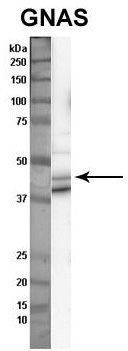G protein alpha S (GNAS) Rabbit Polyclonal Antibody
Frequently bought together (2)
Transient overexpression lysate of GNAS complex locus (GNAS), transcript variant 1
USD 396.00
Other products for "GNAS"
Specifications
| Product Data | |
| Applications | WB |
| Recommended Dilution | WB |
| Reactivities | Human |
| Host | Rabbit |
| Isotype | IgG |
| Clonality | Polyclonal |
| Immunogen | The immunogen for anti-GNAS antibody: synthetic peptide directed towards the N terminal of human GNAS. Synthetic peptide located within the following region: NPENQFRVDYILSVMNVPDFDFPPEFYEHAKALWEDEGVRACYERSNEYQ |
| Formulation | Liquid. Purified antibody supplied in 1x PBS buffer with 0.09% (w/v) sodium azide and 2% sucrose. Note that this product is shipped as lyophilized powder to China customers. |
| Purification | Affinity Purified |
| Conjugation | Unconjugated |
| Storage | Store at -20°C as received. |
| Stability | Stable for 12 months from date of receipt. |
| Predicted Protein Size | 46 kDa |
| Gene Name | GNAS complex locus |
| Database Link | |
| Background | Mutations in GNAS gene result in pseudohypoparathyroidism type 1a, pseudohypoparathyroidism type 1b, Albright hereditary osteodystrophy, pseudopseudohypoparathyroidism, McCune-Albright syndrome, progressive osseus heteroplasia, polyostotic fibrous dysplasia of bone, and some pituitary tumors.This gene has a highly complex imprinted expression pattern. It encodes maternally, paternally, and biallelically expressed proteins which are derived from alternatively spliced transcripts with alternate 5' exons. Each of the upstream exons is within a differentially methylated region, commonly found in imprinted genes. However, the close proximity (14 kb) of two oppositely expressed promoter regions is unusual. In addition, one of the alternate 5' exons introduces a frameshift relative to the other transcripts, resulting in one isoform which is structurally unrelated to the others. An antisense transcript exists, and may regulate imprinting in this region. Mutations in this gene result in pseudohypoparathyroidism type 1a (PHP1a), which has an atypical autosomal dominant inheritance pattern requiring maternal transmission for full penetrance. There are RefSeqs representing four transcript variants of this gene. Other transcript variants including four additional exons have been described; however, their full length sequences have not been determined.This locus has a highly complex imprinted expression pattern. It gives rise to maternally, paternally, and biallelically expressed transcripts that are derived from four alternative promoters and 5' exons. Some transcripts contains a differentially methylated region (DMR) at their 5' exons, and this DMR is commonly found in imprinted genes and correlates with transcript expression. An antisense transcript exists, and this antisense transcript and one of the transcripts are paternally expressed, produce noncoding RNAs, and may regulate imprinting in this region. In addition, one of the transcripts contains a second overlapping ORF, which encodes a structurally unrelated protein - Alex. Alternative splicing of downstream exons is also observed, which results in different forms of the stimulatory G-protein alpha subunit, a key element of the classical signal transduction pathway linking receptor-ligand interactions with the activation of adenylyl cyclase and a variety of cellular reponses. Multiple transcript variants have been found for this gene, but the full-length nature and/or biological validity of some variants have not been determined. Mutations in this gene result in pseudohypoparathyroidism type 1a, pseudohypoparathyroidism type 1b, Albright hereditary osteodystrophy, pseudopseudohypoparathyroidism, McCune-Albright syndrome, progressive osseus heteroplasia, polyostotic fibrous dysplasia of bone, and some pituitary tumors. |
| Synonyms | AHO; C20orf45; GNAS1; GPSA; GSA; GSP; NESP; PHP1A; PHP1B; PHP1C; POH; SgVI |
| Note | Immunogen Sequence Homology: Dog: 100%; Pig: 100%; Rat: 100%; Horse: 100%; Human: 100%; Bovine: 100%; Rabbit: 100%; Guinea pig: 100%; Mouse: 93% |
| Reference Data | |
| Protein Families | Druggable Genome, Secreted Protein |
| Protein Pathways | Calcium signaling pathway, Dilated cardiomyopathy, Gap junction, GnRH signaling pathway, Long-term depression, Melanogenesis, Taste transduction, Vascular smooth muscle contraction, Vibrio cholerae infection |
Documents
| Product Manuals |
| FAQs |
| SDS |
{0} Product Review(s)
0 Product Review(s)
Submit review
Be the first one to submit a review
Product Citations
*Delivery time may vary from web posted schedule. Occasional delays may occur due to unforeseen
complexities in the preparation of your product. International customers may expect an additional 1-2 weeks
in shipping.






























































































































































































































































 Germany
Germany
 Japan
Japan
 United Kingdom
United Kingdom
 China
China





